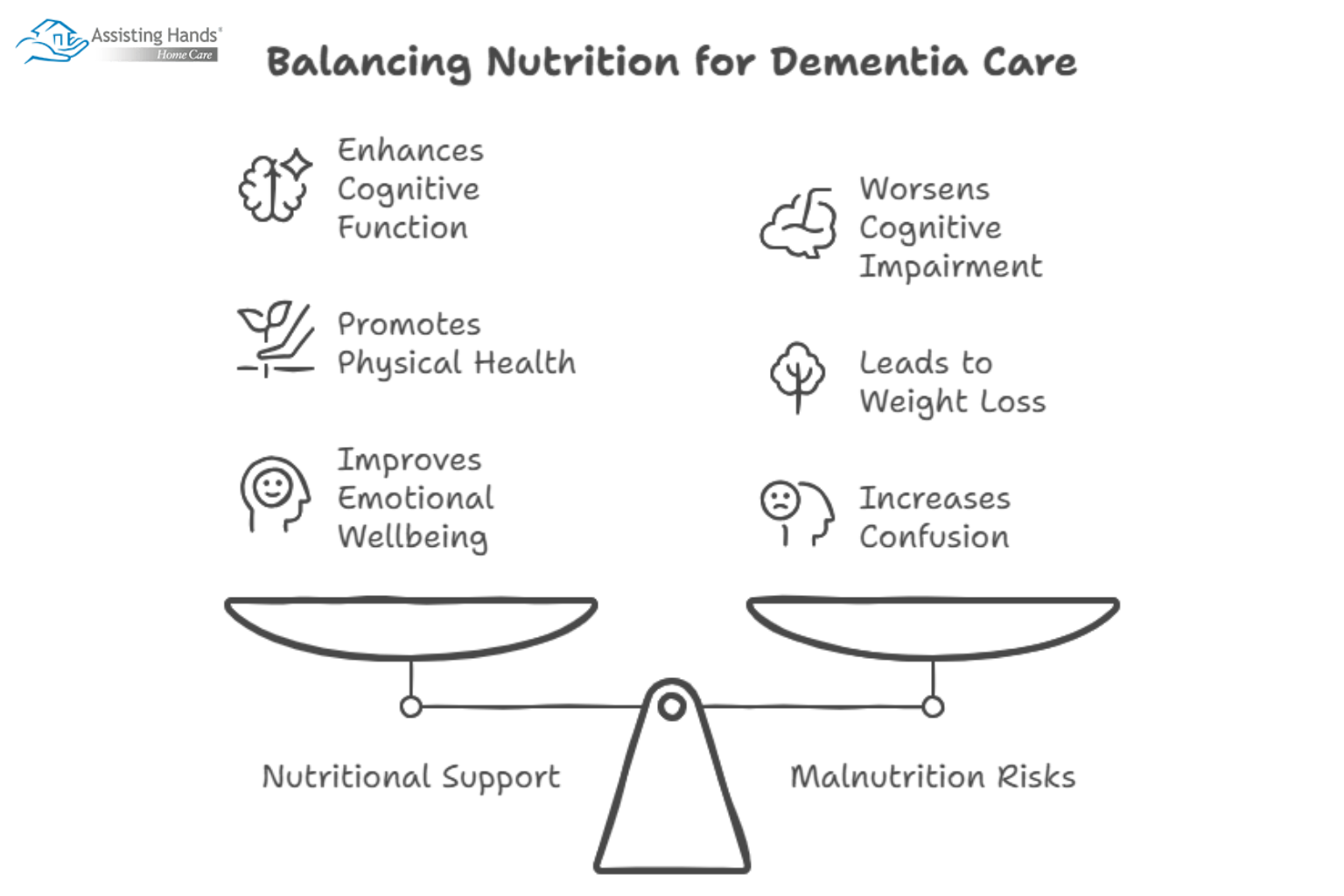
Table of Content
Proper nutrition plays an important role in supporting individuals with dementia, influencing not only their physical health but also their cognitive and emotional wellbeing. By understanding the impact of diet on dementia, caregivers and healthcare professionals can create meal plans tailored to promote better quality of life for seniors living with the condition.

How Nutrition Impacts Brain Health
The brain is highly sensitive to the nutrients it receives, and a balanced diet can maintain its optimal function. Essential nutrients like omega-3 fatty acids, antioxidants, vitamins, and minerals contribute to brain health by reducing inflammation, supporting cell repair, and boosting cognitive function. For instance:
- Omega-3 fatty acids – Found in fish such as salmon and mackerel, omega-3 fatty acids reduce brain inflammation and promote neuroprotection.
- Antioxidants – Foods like berries, spinach, and nuts offer antioxidants that combat oxidative stress, which is linked to cognitive decline.
- Vitamins and minerals – B vitamins, vitamin D, and zinc are particularly beneficial, playing key roles in neural communication and overall brain function.
Ensuring a nutrient-rich diet can slow the progression of dementia symptoms and increase mental clarity.
If your senior loved one has been diagnosed with a serious condition and needs help with tasks like meal prep, transportation, bathing, and grooming, reach out to Assisting Hands Home Care, a leading provider of in-home care families can trust. We also offer comprehensive care for seniors with dementia, Alzheimer’s, and Parkinson’s.
Malnutrition Risks among Dementia Patients
Malnutrition is a significant risk for individuals with dementia due to challenges such as loss of appetite, difficulty chewing or swallowing, or forgetting to eat. These issues often lead to significant weight loss, deficiencies in essential nutrients, and worsening of cognitive impairment.
Caregivers should remain vigilant for signs of malnutrition, such as:
- Rapid weight loss or muscle wasting
- Fatigue and weakness
- Behavioral changes or increased confusion
Simple strategies like offering smaller, more frequent meals or serving easy-to-eat, nutrient-dense foods can address these risks.
The responsibilities that come with caring for a loved one with dementia can sometimes feel overwhelming, but help is available. Seniors can face a variety of age-related challenges. Though some families choose to take on the caregiving duties, there may come a time when they need a trusted Naples at-home care provider. Families sometimes need respite from their duties so they can focus on their other responsibilities, and some seniors need around-the-clock assistance that their families are not able to provide. Assisting Hands Home Care is here to help.
The Role of the Mediterranean Diet
The Mediterranean diet has been widely recognized for its positive impact on brain health, making it a valuable dietary approach for dementia care. This diet emphasizes whole foods, healthy fats, and lean proteins, which collectively support cognitive function. Key components include:
- Fresh fruits and vegetables, particularly leafy greens and berries
- Whole grains like quinoa, brown rice, and oats
- Healthy fats from olive oil, nuts, and seeds
- Lean proteins from fish, legumes, and poultry
Studies suggest adherence to the Mediterranean diet can delay cognitive decline and enhance memory, demonstrating its potential as a dietary approach for individuals with dementia.
Hydration and Its Importance in Dementia Care
Hydration is an often-overlooked aspect of nutrition but is especially critical for dementia patients. Dehydration can exacerbate confusion, agitation, and fatigue, making symptoms more difficult to manage. Additionally, some individuals with dementia may forget to drink water or have difficulty communicating their thirst.
Caregivers can encourage hydration by:
- Offering water or fluids regularly throughout the day
- Providing foods high in water content, such as watermelon, cucumbers, and soups
- Using visual reminders, such as marked water bottles or cups
Maintaining proper hydration is key to supporting physical and cognitive health.
Mealtime Strategies for Dementia Patients
Creating a positive, stress-free mealtime experience can significantly impact the nutrition of individuals with dementia. Many may face challenges like food aversions, sensory changes, or a lack of interest in eating. To make mealtimes more effective:
- Simplify meals – Use minimal seasoning and focus on familiar foods your loved one enjoys.
- Adapt food textures – Offer soft, easy-to-chew options for those with difficulty swallowing.
- Establish routines – Consistent mealtimes create structure and reduce confusion.
- Minimize distractions – A calm, quiet environment can help your loved one focus on eating.
- Encourage engagement – If possible, involve your loved one in food preparation to increase his or her interest in meals.
Focused strategies like these can ensure individuals with dementia get the nutrition they need.
Aging in place can present a few challenges for seniors living with dementia. However, they can still live independently at home with the help of professional dementia care. Naples families can rely on Assisting Hands Home Care to provide their elderly loved ones with mental and social stimulation, timely medication reminders, assistance with meal prep, and much more. Our caregivers are available around the clock to help your loved one live a happier and healthier life. To learn about our premier in-home care plans and how they can help your loved one, give us a call today.






